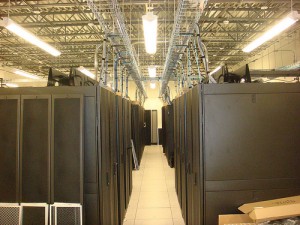What Are Data Centers?
Data centers are facilities that store computer systems and all their support equipment. Data centers usually run the computer applications that handle the operations of an organization, from databases to backup systems. They range in size from a single room to an entire building. From a simple server room to a fully redundant secure computer system, they serve a multitude of different purposes for businesses and government alike. However, there is a new trend in data centers that may signal a marked increase in efficiency and productivity; the modular data center.

Enter The Modular Data Center
The modular data center design looks to build the data center to a custom fit for the operation it supports. These modular systems can be designed quickly, using top of the line components. Usually, they fit in an area the size of a shipping container, so they can be moved on-site. Modular data centers offer several advantages to the traditional data center design.
One problem with data centers is that capacity is notoriously difficult to predict. Most data centers end up grossly oversized for their lifespan. Modular design allows capacity to be added as needed, instead of making an estimate at the beginning of the project. Data centers can stay operational for 10 years or more, making estimates difficult. Also, the systems of the data center can be updated easily with a modular design, allowing new features and capabilities to be added at a lower cost.
Modularity addresses other problems as well, like power consumption. Data centers require UPS, or Uninterruptable Power Supply, to provide services. Designing a large system upfront is cost prohibitive, but modular systems can add more power as needed. These smaller power systems can be placed closer to the computer hardware, reducing the need for expensive cabling.
Cooling is a vital concern with expensive computer equipment. Traditionally, Computer Room Air Conditioners (CRACs) are used to cool entire rooms. However, this system cannot account for specific pieces of equipment that produce large amounts of heat individually. By designing the system in stages, cooling solutions can be placed nearer to these heat generating components. These systems can be controlled by the data center workers, rather than linked to the overall building’s cooling systems, possibly reducing heating and cooling costs. Modularity represents an advance in data center design.
David Shandler is a technologist with varied interests but is interested about the web, and all the various parts that comprise it.






karan
Jul 22. 2011
well written david although i am not concerned with data centres at all:D
Shailesh Tripathi
Jul 24. 2011
Your article on data centers is very interesting and appealing to readers. Thanks and wish to post you more article about it.
TechCrates
Jul 25. 2011
Thanks to our guest author … for the great contribution 🙂
techGALAXY
Jul 24. 2011
nice piece of information. 🙂
cialis 20mg
Aug 03. 2011
Data Centers contain a large number of data in itself.
Morrison data center design
Aug 05. 2011
I recognize the substance of data center design at the moment. I in point of fact am grateful for the facts you have brought together and conveyed. Thank you!
Richard
Mar 19. 2014
Now, more than ever before, we’re able to get even better computing and storage capabilities per watt and per sq. ft. This definitely allows for modular and mobile data centers to become more common. Because a lot of these centers are going to be modular in the future, quick upgrades depending on changing needs are going to be easier than ever. Great piece!